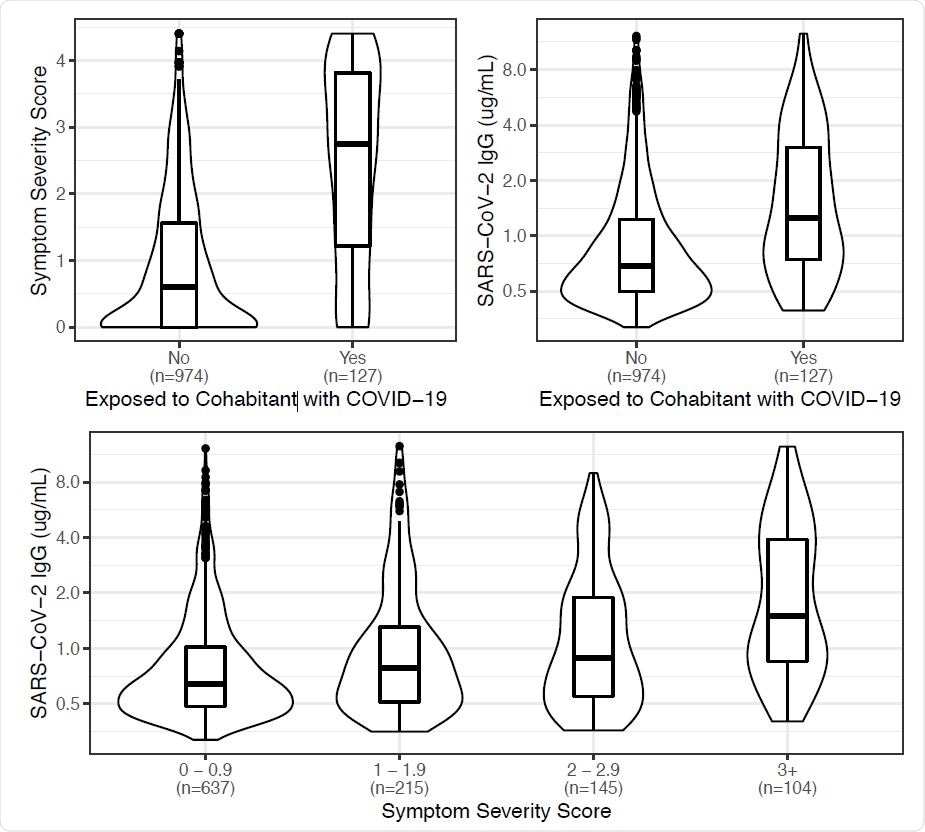The heterogeneous coronavirus disease 2019 (COVID-19) is caused by severe acute respiratory syndrome coronavirus 2 (SARS-CoV-2), first detected in Wuhan, China in late December 2019. While the disease severity and the magnitude of antibody response following a SARS-CoV-2 infection are highly variable, it is hypothesized that the measure of the SARS-CoV-2 viral exposure may contribute to the disease severity.
The viral exposure includes the amount of virus inoculum, closer contact, and more prolonged exposure. And greater disease severity may be associated with more robust antibody responses in the convalescent phase of infection.
In a recent study, researchers found that individuals who lived with people suffering from COVID-19 exhibited greater symptom severity and stronger antibody response. When compared to individuals who were seropositive but did not live with a known COVID-19 case, a greater magnitude of clinical manifestation and immune response was found.
This study suggests that high virus exposure levels contribute to greater disease severity and stronger antibody responses. The observations from this study are published on the medRxiv* preprint server.
"Exposure to SARS-CoV-2 within the household may be more prolonged, physically proximate, and unmitigated by personal protective equipment compared to transient public exposures."
Such a relation between the exposure dose and the subsequent disease severity has been previously demonstrated experimentally for other respiratory viruses, such as influenza, a respiratory disease. Additionally, it is also proven that the higher SARS-CoV-2 viral load during acute infection in humans has been linked to greater disease severity.

Associations between exposure to a cohabitant with Covid-19, symptom severity scores, and SARS-CoV-2 antibody concentrations. The y-axis for SARS-CoV-2 IgG concentrations is presented on a log2 scale. Data are from a community-based sample of seropositive adults from the Chicago area (n=1011). The distribution for each category is represented by smoothed kernel density plots overlaid with boxplots depicting interquartile ranges. This figure was created using the R package “ggplot2” (version 3.3.2).
In a previous study, the researchers reported that individuals who reported more symptoms had higher concentrations of immunoglobulin G (IgG) antibodies in a community-based sample of seropositive adults.
This study's participants screened positive for SARS-CoV-2 in the Screening for Coronavirus Antibodies in Neighborhoods (SCAN) study. Through diverse recruitment methods, the participants were recruited from neighborhoods throughout the Chicago area and personnel of the Northwestern University Feinberg School of Medicine (FSM) in Chicago.
To assess the exposure to cohabitants with COVID-19 the participants were asked the following question, "Since March 1, 2020, has anyone in your household been told by a healthcare provider that they have, or likely have, COVID-19? Do not include yourself when answering this question." The median date of inclusion in the study was October 23rd, 2020 (Range: June 30th, 2020 to January 20th, 2021).
"The results of our study demonstrate the importance of broad sampling strategies that capture an adequate range of variation in exposure context, symptom severity, and acquired immunity."
This is an important study where the researchers confirmed that the seropositive individuals who lived with a cohabitant with COVID-19 had substantially greater symptom severity and IgG antibody responses compared to seropositive individuals who did not report having a cohabitant with COVID-19. This study reported that working close to others did not exhibit statistically significant associations with symptom severity or IgG antibody concentrations.
Notably, the researchers pointed out that this study design does not determine whether the cohabitant diagnosed with COVID-19 was the first instance of SARS-CoV-2 exposure within the household. Future studies are required to track the sequence of seroconversion and symptom occurrence - to see if study participants may have been exposed before the cohabitant.
As discussed in the study, the observations here emphasize the importance of preventing transmission within households - to reduce rates of symptomatic COVID-19. As a critical area of focus for public health efforts, Policies and interventions must include measures to reduce transmission within households (e.g., intensive testing, contact tracing, and isolation programs).
Even if people are isolated when co-inhabitants develop symptoms of COVID-19, it is demonstrated that high levels of SARS-CoV-2 viral shedding occur before the onset of symptoms. To isolate individuals who are living within a household maybe not achievable in many situations. Like other respiratory virus exposures within a household (such as the measles epidemics), preventing transmission within a household should become a critical area of focus to mitigate SARS-CoV-2 transmission and COVID-19.
This study also throws light on the implications of exposure dose and evaluating any possible changes in vaccination strategies. Robust immune responses are observed after a single dose of an mRNA vaccine among seropositive individuals who had milder disease or lower levels of pre-vaccination antibodies resulting from prior natural infection.
The results of this study demonstrate the importance of broad sampling strategies that capture an adequate range of variation in exposure context, symptom severity, and acquired immunity, the researchers write.
Journal reference:
- Exposure to SARS-CoV-2 within the household is associated with greater symptom severity and stronger antibody responses in a community-based sample of seropositive adults, Joshua M. Schrock, Daniel T. Ryan, Rana Saber, Nanette Benbow, Lauren A. Vaught, Nina Reiser, Matthew P. Velez, Ryan Hsieh, Michael Newcomb, Alexis R. Demonbreun, Brian Mustanski, Elizabeth M. McNally, Richard D'Aquila, Thomas W. McDade, medRxiv 2021.03.11.21253421; doi: https://doi.org/10.1101/2021.03.11.21253421, https://www.medrxiv.org/content/10.1101/2021.03.11.21253421v1